PFest: Walkin’ the Dogs
What Dog(s) Am I Getting?
One thing I didn’t expect to learn so much about Pheasant Fest was dogs.
I grew up with dogs, but didn’t hunt as a kid, and if you’ve read Serious Grouse Hunting, Book 1 you know that Brendan and I believe wholeheartedly that you don’t need a dog to hunt grouse. In fact, there are times when you don’t need a dog to hunt pheasants (or a gun…). Maybe even other upland species.
Without going into the exact definition of “need,” we all know that dogs are part of the fun and magic of bird hunting. I knew that walking into Pheasant Fest, and in hindsight I’m not sure if I knew much more than that. Because I learned a ton about dogs there.
I’ve already mentioned that there were about 170 seminars at Pheasant Fest. And I have to think that around 75% of them had to do with dogs: buying, training, particular species, nutrition, health, hunting – I’m probably leaving something out but you get the picture. Fascinating stuff.
I’ll get into some of that in a future post, but what I didn’t expect was walking out of the Fest with the certainty that I will own multiple dogs, at the same time, of multiple breeds.
Like Buying a Car…
Disclaimer: All dog owners and dog breeders are passionate about their dogs and their breeds, all of which have merit. This is not judgmental in any way, and any ignorance you read here obviously is my own. Having said that:
Labs and Tollers
I already know I’m getting a Lab, a black one. I know this because my 7-year-old daughter has wanted one for years now and she’s going to get one. (She’s all about dogs and birds, and cried when she found out she couldn’t come to Pheasant Fest with me. I felt pretty bad about it….) So a Lab is a definite.
My 9-year-old son of course wants a different dog, a golden retriever. Hmmmm. No offense to golden lovers, but it’s not on my list of desired dogs, especially since we’re getting a Lab.
But then I saw a particularly fine specimen of what looked a lot like a golden retriever, but smaller, redder and with white on its paws and chest.
I initially saw it at one of the seminars, and the guy holding it was one of the experts standing at the front of the room. His name is Paul Kartes, a former engineer who now trains hunting dogs – including the breed I came to learn is the Nova Scotia duck tolling retriever.
Seriously, that’s the name. Took a while to remember that one in full.
As you can imagine, not too many of these dogs around, which automatically makes them cool – and somewhat expensive. For better or worse I emailed some shots of these dogs home, and of course now my son is obsessed with them.
After listening to Paul, getting to know him a little, seeing these super-cool dogs and my son on my back about the dog “his sister is getting,†I’m sure I’ll own one in the future. (Paul’s website is Lakota Retrievers.)
The Winnah…
And now to the dog I think I want. For me. Not that the other dogs won’t be hunting because they will: Since I’m feeding them and paying for them to go to the vet, they at least will be helping me find birds.
Anyhow, the winnah is (maybe): the wirehaired pointing griffon (WPG).
To some extent, trying to find the ideal breed of dog is an impossible mission. Even cars – that you can turn on and turn off, don’t have to feed and can live outside all year round – are never optimal. That’s a valid analogy because to some extent when you interview dog breeders or listen to them talk enthusiastically about their breed of dog, that breed sounds pretty much ideal. No matter what it is.
It’ll hunt like a house on fire, but back at home will be a great family dog. It’ll get along with other dogs. It’ll hunt close or big, it’ll retrieve like a champ. It doesn’t shed too much. It’s good with kids.
Sold!
After a while I felt like I was hearing roughly the same things from everyone – and I was, sort of. Because well-bred, well-trained hunting dogs are, in many ways, ideal. And because I’d already selected out some breeds based on what I’ve seen them do/not do in the field and in homes.
Now, with the WPGs you might think I’m jumping on the bandwagon because recently the AKC released its most popular breeds in the US list, and the WPG jumped the most places year-to-year: from 108th to 93rd.
I give that three letters: BFD.
But I wonder whether people are digging the fact that this breed seems to be a good all-around hunter, can work close or far, points and retrieves everything (including woodcock) and seems content to be in a semi coma when in the house. (That’s the part my wife liked the best.)
I’m not rock solid on the breed yet, but I’m in to try and get to the Wirehaired Pointing Griffon Club of America’s Northeast Chapter spring hunt test (Saturday, May 7, Bangor, ME – for more info on these dogs, click here to go to the WPGCA website).
And there you have it: where I’m at in dog world, and yet another reason to go to next year’s Pheasant Fest.
More: Tollers
What the heck is a duck tolling anything? More from a dog breeds website and wikipedia:
Tolling Red Decoy Dogs probably accompanied their masters from Great Britain to Nova Scotia. They were crossed with retrievers and working spaniels. The breed was developed to “toll” (or lure) ducks in the manner of the fox.
The hunter stays hidden in a blind and sends the dog out to romp and play near the water, usually by tossing a ball or stick to be retrieved. Appearing similar to a fox, the dog’s unusual activity and white markings pique the curiosity of ducks and geese, who swim over to investigate.
Native Americans utilized this mesmerizing practice by stringing a fox skin across a length of shore and yanking it quickly back and forth, simulating the movement of the fox.
[That’s the part I don’t get – why the heck would ducks swim over to investigate a fox? Waterfowlers help me out here….]
When the birds are close, the hunter calls the dog back to the blind, then rises, putting the birds to flight, allowing him a shot. The Toller then retrieves any downed birds. They are particularly suited for retrieving in cold water climates because of their water-repellent double coat.
Category: Dogs in general, Labs, Lakota Retrievers, Pheasant Fest, Pheasants Forever, Tollers, WPG Club of Amer., WPGs

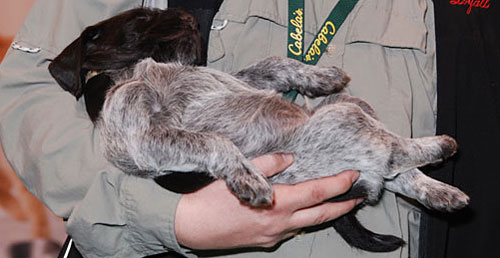
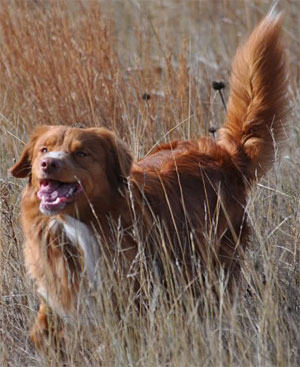
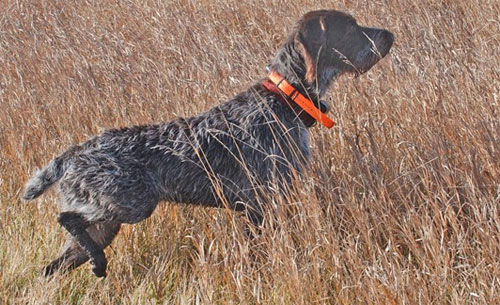




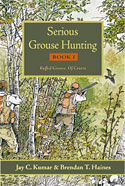

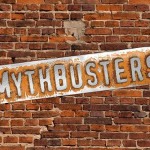
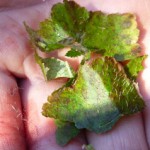
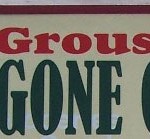
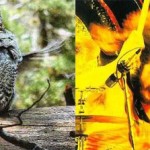
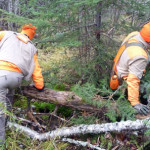
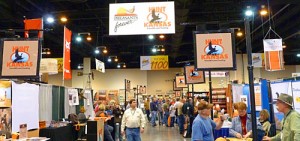
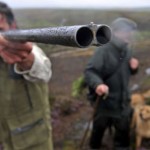
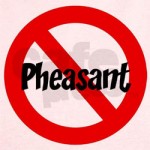
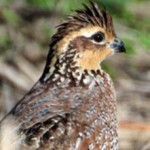
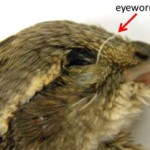

If you dig into the history of the Wirehaired Pointing Griffon breed, you’ll find that the WPGCA’s dogs are crossbred with the Cesky Fousek and not recognized by the AKC. There are several of us independent AKC WPG breeders, but the official AKC club is the AWPGA. It was quite a controversy in the WPG world to have the non-AKC club “representing” the breed at Pheasant Fest. We hope to rectify this situation at Pheasant Fest 2012. Please let me know if you have any questions about the Wirehaired Pointing Griffon, its related clubs, or individual breeders. As a Nebraskan, I am bound to give you an honest, objective answer. I have more demand for pups than I have supply, so I’m not just trying to sell you a dog, I am an ambassador of the breed and want to help people who are interested.
If you research the history of the Wirehaired Pointing Griffon, you’ll find that the WPGCA’s dogs are crossbred with the Cesky Fousek and not recognized by the AKC. Please let me know if you have any questions about the Wirehaired Pointing Griffon, its clubs, or individual breeders. I have more demand than supply, so I am not just trying to sell you a dog. I consider myself an ambassador of the breed and want to help anyone interested.
I see they already posted the WAR in that breed. I don’t have one. Might think about one in the future. It’s an interesting war they have going on. I think both sides have protected the hunting traits. Never heard a bad thing about noses or desire. They are good looking dogs. The only thing that would wear thin is the argument to outcross to other breeds or not. A pure breed is in declination mathematically any way. Both camps have good breeding programs. I think they have breed wardens but I am not sure.
Either way you are fine. You just have to put up with the wine drinkers that brag about the hunt that don’t own guns.
I would gamble on one those dogs in a heart beat. I don’t think you will go wrong and I am a Brittany guy.
The WPGCA openly discussed this in their presentation at PFest. I have no opinion one way or the other, and honestly wouldn’t care if I was hunting behind a mutt as long as it was a good bird dog!
This war between the two clubs means nothing. Lots of breeds have had other blood introduced. This is usually done for the betterment of the breed. The claim that the WPGCA isn’t recognized by the AKC means nothing either. The AKC isn’t the only dog registry. Many breeds are split between different registry, and some have avoided being dragged in at all. The VDD being one of them, keeping their own registry. What matters is that breeders are breeding for the betterment of the breed, and that you find a suitable hunting dog. Too many of the sporting breeds have been rendered uselss by poor breeding. If breeders want to feel good about themselves then they should stop this saber rattling, and let the performance of their dogs speak for them. And no, I don’t own one of these. In my book there are only three breeds of bird dog, Setters, Springers, and Labs.
Agreed ,my favorite dog is a good one. I think we should just consolidate all the knee jerk dog and hunting topics,
Steady to Wing Shot and Fall vs Steady to Flush
Pointers vs Flushers
Tritronics vs DT Systems
Del Mar Smith vs Wolters
Pen Birds vs Wild Birds
etc.. etc.. etc. Call it the dog controversy web site. Maybe it will funnel all the bad dog karma there.
Get the dog put it on the ground have fun!
Fantastic choice with the Wirehaired Pointing Griffon! My beloved black lab who was fantastic with grouse, woodcock, pheasants, sharptails and waterfowl left this life last May. I surprised my wife and friends by getting a griffon for the reasons you list. My young WPG was introduced to ruffed grouse in the U.P. of Michigan last October at the age of 5 months. The week long trip saw her develop rapidly. She has taken to grouse and pheasants easily. Retrieves like a champ. Took to water without hesitation. Travels well. Wonderful friend at home. She goes with me daily to my medical office and is great with patients and strangers. One of the best canine athletes I’ve seen. Very intelligent and easy to train. I’m still heartbroken about my lab. I’ve had german shorthair pointers as well. But the Wirehair Pointing Griffon is an outstanding breed. I avoided the controversy and did not get a puppy from the WPGCA. However, get the books written by Joan Bailey on training this wonderful breed. She is an advocate of the WPGCA.
Note that the WPGCA is not the AKC approved group for the “Griffon”. Go to the AWPGA web site for more information.
After years of Labs and hunting behind my buddies English Setters, when he decided to up and move to Vermont for a full time dose of forest chickens I needed a pointer and a retreiver. A water dog and field dog that loved to sleep on the floor of my office all day or hit every inch of bird cover when the truck door opens. My daughter fell in love with a Dutchman and I came to know the Korthals Griffon. A little research and I landed a sweet puppy and new training/hunting chapter began. “Chase”, with the help of my local NAVHDA clubmates, has become a dog anyone might be happy to hunt behind. Her first season this last year, got the best compliment by my well seasoned handler hunting pals… “hey Dennis come-on up here, your dog is on point AGAIN…” Steady to flush, shot and fall, working on sharing the field with others, seems she wants to point and retrieve all the birds, well there is always work to do. Griffs are the best dog I never knew about. Do your research and find the breeder that best fits your style and off you go. Best of luck.
i did read your book but do not agree that you don’t need a dog to hunt Grouse. I have an English Setter that comes from a long line of Grouse hunters and I definitley see and hear more birds with her than I ever did without her. Now that I hunt with a dog that hunts Grouse very well I wonder how many birds I have walked by in the past. With the dog it does not happen too often because if the birds are there she will find them.
ED